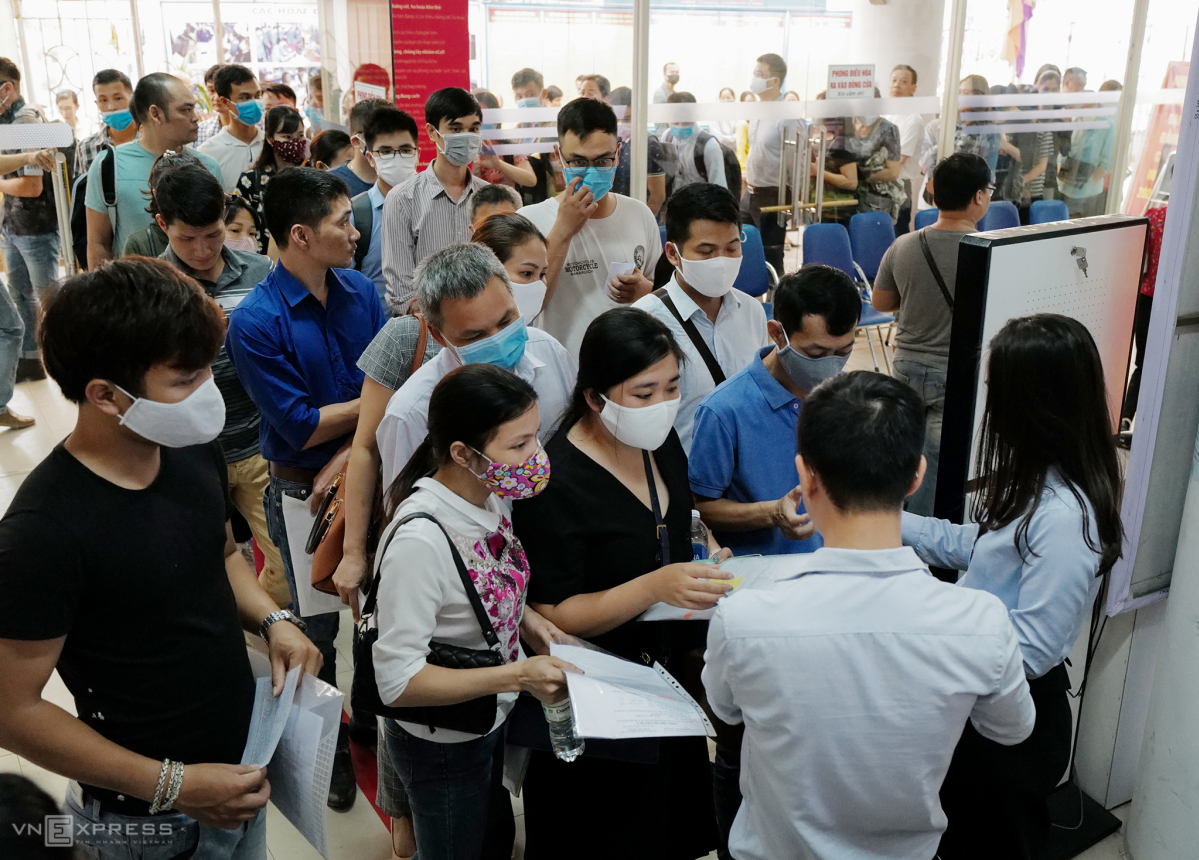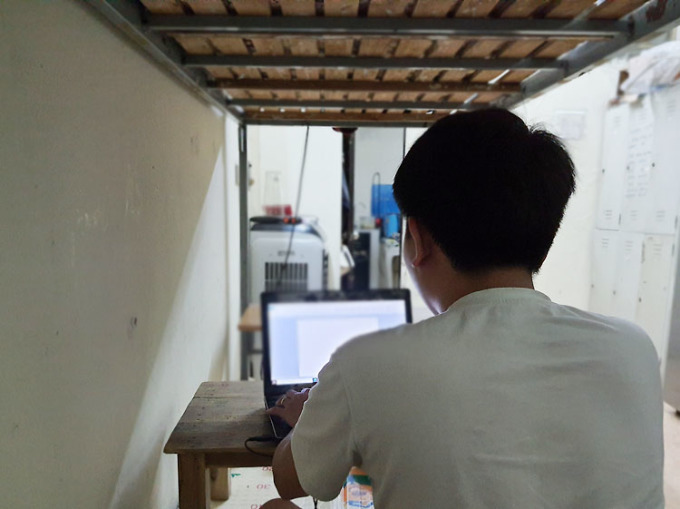Nguyen Minh Hong, 26, quit her job as an administrative employee in HCMC a month before Tet (Lunar New Year).
She had interviewed at four companies but decided to quit anyway though she was not hired.
Welcome to the global phenomenon known as The Great Resignation, which swept across the Americas, Europe and other parts of Asia before coming to Vietnam’s shores.
 |
|
Workers line up for unemployment benefits in Hanoi’s Cau Giay District in June 2020. Photo by VnExpress/Ngoc Thanh |
But it comes at a time when Covid has subsided and the country is adjusting to life with the pandemic.
According to the General Statistics Office, as of the end of last year more than 1.4 million people were unemployed, 0.54 percent up from 2020.
An online survey by recruitment consulting company Anphabe found that six out of 10 people are looking for new jobs.
Anphabe said many decided to switch jobs because of fatigue and disconnection with their colleagues and company as a result of the pandemic.
A 2021 study by global management consulting firm McKinsey & Company in eight countries with a diverse range of economic and labor markets also came up with similar findings.
Before the pandemic only 6 percent of workers wanted to change jobs for higher salaries, but this rate has now risen to 25 percent.
Hong says she wanted to quit because she no longer felt a connection with colleagues and did not want to continue with the company.
She started working at the beginning of 2020, when the outbreak started, and so she and her colleagues hardly knew each other since they mainly worked online. On days she was at the office, everyone wore masks and spoke only about work.
“I felt lost”.
Last year everyone in her family contracted Covid and she had to be isolated for nearly three months, making her connection with the company even more tenuous.
Despite taking a long break from work, she was paid an allowance, which discomfited her.
“Though the amount was not much, I still felt like I was in debt to a stranger”. In the event she quit without waiting to collect her year-end bonus.
When businesses reopened one by one at the end of the year, she decided to look for new opportunities.
 |
|
Hoang Minh works a night shift in March 2021 between 10 p.m and 6 a.m. to earn VND6 million ($261) a month. Photo courtesy of Minh |
The pandemic tied down Nguyen Hoang Minh, 22, of Hanoi’s Cau Giay District, for the last two years.
He quit his job at a foreign company in early 2020. Within four months he switched jobs several times, in turn becoming a real estate broker and a bank credit officer among others, but the income was not steady, and he returned to his old company.
During the recent Tet holidays, when many job opportunities were available, he mustered up courage to call and inform his boss he had decided quit.
Minh identifies himself as a “job hopper,” a person who usually stays with a company for not more than two years and a bunch that accounts for 17 percent of Vietnam’s labor market.
But workers in the standard group, who are with a company for around 4.5 years (accounting for 64 percent) like Nguyen Thu Minh of Hanoi’s Thanh Xuan District also feel depressed and tired.
The 32-year-old, who works in the media, says: “A tumultuous year left me on the edge. I started to realize that this job is no longer the right fit for me”.
While hunkering down at home during the pandemic, she kept asking herself one question: “Does my work add any value to society?”
According to Dr Ly Qui Trung, a professor at the Western Sydney University in Australia, the Covid-19 outbreak, combined with the 4.0 technology era, has created an environment in which more young workers can switch jobs in a short period of time and many to work remotely.
The post-Covid job-hopping trend is causing difficulties for the economy, especially businesses’ recovery.
According to a survey by the General Statistics Office of 22,000 companies, nearly 18 percent said there was a labor shortage, with the highest rate of 30.6 percent being in the southeast.
Businesses must also spend more on recruitment and training, which raises production costs and contributes to inflation.
 |
|
A seafood processing factory at the Tan Tao Industrial Park in HCMC, lacked workers before Lunar New Year. Photo by VnExpress/An Phuong |
Dr Pham Khanh Nam, dean of the economics faculty at the Ho Chi Minh City University of Economics, said besides greater monetary rewards, benefits such as vaccination, testing, transportation, and skills training should also be provided to retain workers.
Experts warn employees that instead of rushing to switch jobs, they need to have a suitable road map and clearly defined career goals, and know what they need to learn to achieve them.
Thu Minh is taking online courses to improve her knowledge of psychology, in which she got her university degree, since she is planning to a company in this field.
Hong is receiving unemployment benefits and plans to trade or renovate motels for sublease rather than work for a salary.
Hoang Minh has been hired for a marketing job by a cosmetic company.
“I’m not sure how long I’ll stay here,” the man from the super job hopping group admits.
- Reduce Hair Loss with PURA D’OR Gold Label Shampoo
- Castor Oil Has Made a “Huge” Difference With Hair and Brow Growth
- Excessive hair loss in men: Signs of illness that cannot be subjective
- Dịch Vụ SEO Website ở Los Angeles, CA: đưa trang web doanh nghiệp bạn lên top Google
- Nails Salon Sierra Madre
 VnExpress News The News Gateway of Vietnam
VnExpress News The News Gateway of Vietnam





